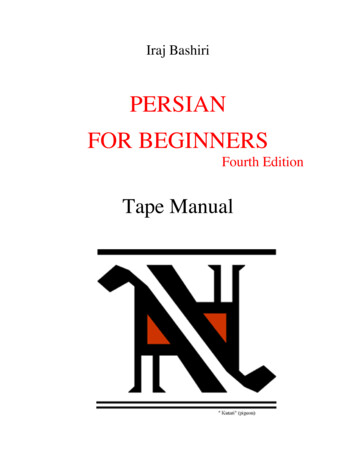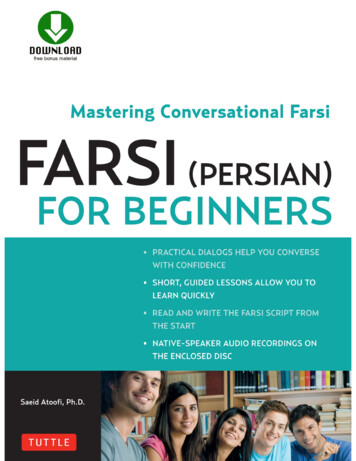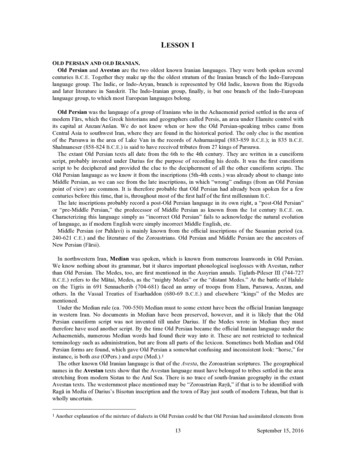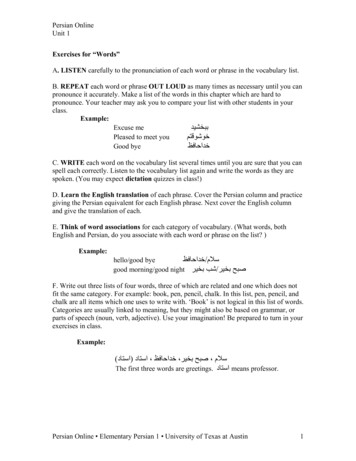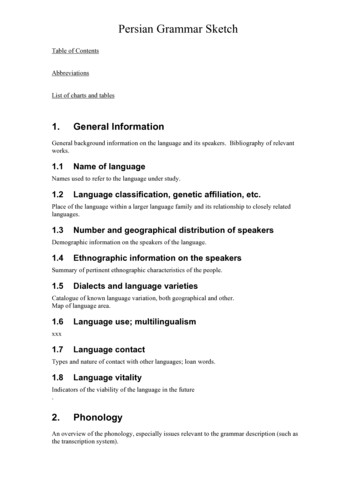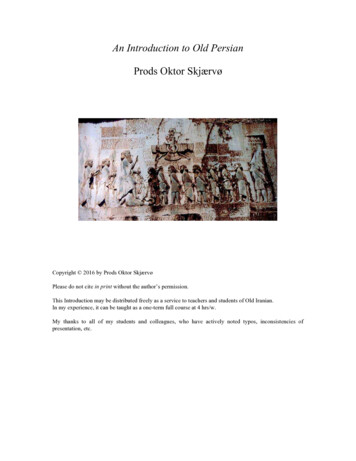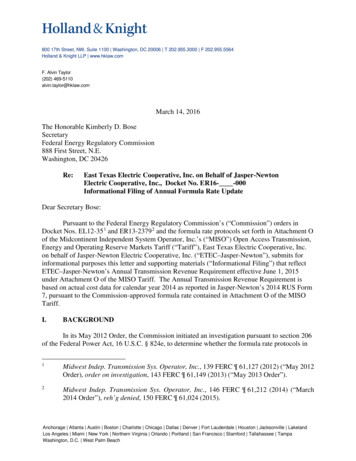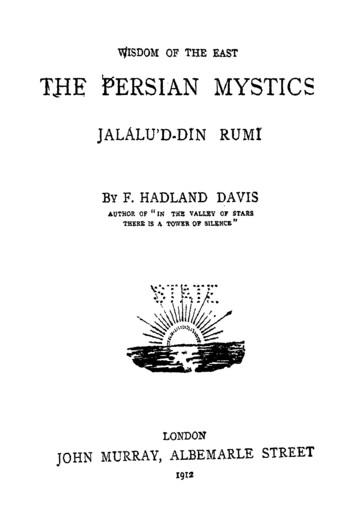
Transcription
ISDOM OF THE EASTTHE PERSIAN MYSTICSJALALU'D-DIN RUM!BYF.HADLAND DAVIS"AUTHOR OF IN THE VALLEY OF STARS"THERE IS A TOWER OP SILENCE"!LONDONSTREETJOHN MURRAY, ALBEMARLE1912
ALL RIGHTS
TOA. T. K.THIS LITTLE BOOK OF EASTERN WISDOMISLOVINGLY INSCRIBED
" OURJOURNEYisTO THE ROSE-GARDEN OF UNIONjALA"LU'D-DfN
PREFACEDESIREto thank Mr. R. A. Nicholson forkind and generous permission to useselections from his Dwani Shamsi Tabriz, andIhisalso his publishers, the Cambridge Press.I amdeeply indebted to Mr. E. H. Whinfield forallowing me to use quotations from his renderingIof the Masnavi (Triibner's Oriental Series).thank Mr. John Hastie for givingpermission to quote a few passages from the""Festival of Springlate Rev. Professor Hastie's(James Maclehose and Sons, Glasgow). Thepoems quoted from this volume are entitled :Rose," "I saw the Winter weaving,""Thy""Love sounds the Music of the Spheres," The"The Beloved All inSouls Love-moved," andAll the other translations from the lyricalAll."poetry of Jalalu'd-Din Rumi are by Mr. R. A.also cordiallymeNicholson.Tothese gentlemen,7andto those
PREFACE8I haveleftunnamed, I tendermy warmest thanksfor their help, sympathy, and interest in"attempt to popularise the wisest of the PersianmyStiffs."F.LONDON,January22, 1907.HADLANBDAVIS.
CONTENTS11INTRODUCTIONI.II.III.IV.V.ORIGIN OF SUFHSM.11.THE EARLY SUFISTHE NATURE OF SUFIISMTHE INFLUENCE OF SUFIISMANALYSIS OF THE RELIGION OF LOVE.14-20.27.31.THE LIFE AND WORK OF JALILU'D-DIN KtiMf 34I.II.III.LIFESHAMSI TABRIZ.3436.THE STORIES OP AL-AFLAKI AND THE DEATHOF JALALU'D-DIN RUM!38THE NATURE AND SIGNIFICANCE OF JALALU'DDIN RUMI'S POETRY40.IV.-.""SELECTIONS FROM THE DIVANI SHAMSI TABRIZ 44SELECTIONS FROM THE "MASNAVI"APPENDIX:A.NOTE ON PERSIAN POETRY.68.101
EDITOBIAL NOTEof this series is a veryobject of the Editorsabove all things that,desireone.definiteTheyin their humble way, these books shall be theTEEambassadors of good-will and understandingbetween East and West the old world ofThought and the new of Action. In this endeavour, and in their own sphere, they are butfollowers of the highest example in the land.They are confident that a deeper knowledge ofthe great ideals and lofty philosophy of Orientalthought may help to a revival of that true spiritof Charity which neither despises nor fears thenation of another creed and colour.L.S.NOBTHBROOK SOCIETY,21,CBOMWBLL ROAD,KENSINGTON, S.W.CRANMEK-BYNGKA. KAPADIA,
INTRODUCTIONI.THE OKIQIN OF SumsMA MONG the Mohammedans Sufiism,JLA-knownor PersianThemysticism,"derivedisfromwool"word Siifi uf, meaningWhen a little Persian sect at the end of theisas tasawmf.century A.D. broke away from theorthodox Muslim religion, and struck out oneighthan independent path, they ignored costly robesand worldly ostentation, and clad themselves ina white wool garment. Hence they were"wool wearers," or Sufis.asEdwardG,Browneknown*gives four theoriesthetoofin regardSufiism, viz.(1) Esooriginteric Doctrine of the Prophet.(2) Reaction ofProf.:theAryan mind against a Semiticreligion.(3)Neo-Pktonist influence. (4) Independent origin.Neither of the four theories altogether satisfiesthe learned professor,*Aand very certainLiterary Hitiory of Persia, vol.ULitis
NEO-PLATONISM12that the last-mentioned theory is of very littleProf. Browne seems in favour of a.""spontaneous growth existing in various forms,under various names throughout the civilisedaccount.all this is not very tangibleMoreover, we must bear in mind thatthe Neo-Platonist philosophers paid a visit tothe Persian court in the sixth century A.D.,and founded a school there in the reign of Nushirwan. It is highly probable, therefore, that theseseven philosophers, forced to leave their homesthrough the tyranny of Justinian, who forbadethe teaching of philosophy at Athens, shouldworld;but afterevidence.have had considerable influence upon a few ofthe more thoughtful Persians,find that this theoryevidence.Let usbrieflyisThe Neo-Platonists believedGoodas the Source of all things.itgeneratedshallnowstudy the tenets of Neo-Platon-ism.fromreflection of itsWeborne out by internalownitself.Being.in theSupremeSelf-existent,CreationwastheNature, therefore,Matter was essenti-was permeated with God.ally non-existent, a temporary and ever-movingshadow for the embodiment of the Divine. TheNeo-Platonists believed that by ecstasy andcontemplation of the All-Good, man would riseto that Source from whence he came.Thesepointsbear directly upon the Sufi teaching.They form a broad outline of the tenets of
NEO-PLATONISM AND STJFIISMSiifiism.TheSufis,13from temperamental andother causes, elaborated these ideas,gave thema rich and beautiful setting, and, what is all-important, built about them one of the mostinteresting phases of mystical poetry the worldhas ever known, and this particular phase maybe said to date from the twelfth century A.D.Thus, I think, it will be readily admitted thatthe Sufis certainly owed something to the Neo-The cry for the Beloved was in theirhearts before the Greek philosophers camebutNeo-Platonism appealed to their Oriental minds.Platonists.;Itwas a stepping-stoneacross the river of theirparticular spiritual tendencies, and they trodthereon, and proceeded to lay down otherstones across the stream. I have pointed outthe similarities between this particular Greekand Persian belief. There was, however, onevery important difference. The Neo-Platonist'sconception of God was purely abstract, the Sufi'sessentially personal, as far as the early Sufiswere concerned. We shall consider other influences which were brought to bear upon Sufiisma little later on. There is a very great differencebetween the early Sufiism and the elaboratethat followed as an evolutionarymatter of course.In brief, then, Neo-Platonism was the doctrineA quotation from the letter ofof Ecstasy.additionsPlotinus to Placcuson Ecstasywill still further
THE EARLY SUFIS14show the similarities between this Greek andPersian teaching"The wise man recognises the idea of theGood within him. This he develops by withdrawal into the Holy Place of his own soul. Hewho does not understand how the soul containsthe Beautiful within itself, seeks to realise:beauty without, by laborious production.Hisaim should rather be to concentrate and simplify,and so to expand his being instead of going out;into the Manifold, to forsake it for the One,and so to float upwards towards the DivineFount of Being whose stream flows withinhim."Tliis isSufiism in prose.same conception intoII.theTheSufis turned thepoetry.THE EARLYSTJFIS.HASHIM (ob. 150 A.H.) was the first to bearname of Sufi, while Dhu'1-Nun-al-Misri(245 A.H.) may be said to have given Sufiism itspermanent shape. Rabi'a, of Basra, was thewoman to join the sect, and her saintlinessand wise sayings have been preserved by Faridu'dDin 'Attar. One day a great sickness fell uponBabi'a, and on being asked the reason for it"she repliedI dwelt upon the joys of Paradiseand therefore my Beloved has chastened me."first:
RABI'A15Rabi'a did not believe in earthly marriage. Her"remark on the subject is given as followsThebonds of wedlock have descended upon me. Iam not my own, but my Lord's, and must not be:to Him." 'Attarwhen Rabi'a was askedinforms usshe hated thelove to God leavesunfaithfulthat"she repliedMyno time to hate him." Rabi'a was adevil,meofalsoif:much independencewomanof thought, ethical ratherthan metaphysical in her remarks, and stronglyopposed to outward ceremonials. She is saidto have died at Jerusalem, 753 A.D. It was atRamla, in Palestine, that a Christian noblemanbuilt a convent (Khangah) for the Sufis.Thusin the early days the sect defied their Prophet'scondemnation of monkery by building an abodeThe Sufis werefor members of the order.strongly opposed to the idea of free-will orand self-existent personality apart fromthe Beloved. The orthodox Muslim's idea wasThe Sufis have alwaysprecisely the reverse.made the Koran their text-book. With infinitedistinctingeniously quote therefrom, andtheir own explanationswhen necessary. No doubt there were politicalreasons for adopting this method of concealingheterodox ideas under the cloak of orthodoxy.shall see, however, as the sect grew andthat thesestill further broadened its views,clever compromises did not prevent the appearlicence theystillWemore ingeniously add
BAYAZ1JJ16ance of martyrs among their number in thefuture.By the end of the second century of the Hijirathe Sufis were a much-respected religious order.In the following century Quietism had not onlychanged to Pantheism, but Pantheism hadkindled a belief that Beloved and lover wereidentical.The step was inevitable and at thiswas that Sufiism became essentiallyandit became more mystical as yearsmystical,advanced. About this time, viz., the beginningof the third century A.H., we come across twointeresting Sufis who seem to have been theprime movers in this new development, by nameBayazid and Mansur al-Hallaj.Concerning the saint Bayazid an interestingstory is told in the Fourth Book of the Masnavi.The saint surprised his disciples one day by"itjunctureThereTheILo,saying:ismyselfno God besideam God Almighty.me worship me "!;thinking their Master was besidehimself, told him, when the strange ecstasy haddisciples,what he hadsaid.Bayazid promptlydo so again straightway slayme " His disciples accordingly sharpened their"knives. Once more Bayazid cried outWithinvestureisbutwhetherGod,mynaughtyou seekHim on earth or heaven." The disciples, horror-passed,replied":IfI!:struck at his remarks, straightway plunged theirknives into Bayazid's body. But their blades
MANSUR AL-HALLAJ17were turned back against their own throats,so that they died.He explained to the fewdisciples, who had not struck him, that theecstasy he had been experiencing annihilated"His form is vanished, he is a mere mirror."self,who hadstruck him saw their ownand so wounded themselves,and not Bayazid, whose soul had left the mirrorof his body and was one with the Beloved.Perhaps the life of Mansur al-Hallaj is evenmore interesting. Whether he was a mereThedisciplesfaces in that mirroradventurer or genuine exponent of Sufiism isopen to controversy among modern Sufis.It will be perfectly safe to describe him as eitherstillsaint or a vagabond.He was possibly bothextremes to suit the necessities of a very excitingand eventful career. He was born in the closeof the ninth century A.D., and was said toperform many miracles, such as raising the deadto life, and drawing gold and flowers from theair.According to his own belief he could writeverses equal to those of the Koran. He went""one better than thesuperman theory, how-aever, and called himself God, and his disciplesAkbar was calledafter the various prophets.God, but deification in this case did not soundhis own trumpet ; it sounded from the"See Akbartrumpet of an enthusiastic poetfrom:and youseeGod."Al-Hallajvisitedfor the purpose of studying magic,Indiaand there
MANSUR AL-HALLAJ18saw the celebrated Rope Trick, on that occasionperformed by a woman, a point of considerableinterest.* This mystic-adventurer wrote fortysix books, and certainly gained considerableinfluence over the lower classes by his manyHe is said to have disputedsigns and wonders.the necessity of making a pilgrimage to Meccaby stating that by occult practices it could beperformed equally well in any room. On acertain occasion, however, we cannot help butadmire Al-Hallafs wit and aptitude. One dayhe stretched forth an empty hand and producedfrom the air an apple, which he asserted he hadplucked from Paradise. One of his witnessesdisputed his assertion, because this particularapple was maggot-eaten, and therefore not of"Divine origin. Al-Hallaj at once repliedItis because it hath come forth from the Mansionof Eternity to the Abode of Decay: therefore to its heart hath corruption found its:way"!Al-Hallaj, on account of his various hereticalteachings, was imprisoned and subjected to allmanner of cruelties. Bravely he went forthto the place of crucifixion. For fourdays henailed on a cross .on both sides of theTigris.From these tortures he was finally released. Tenwasyears later he* "AmongOccult Review,was executed,telling his disciplesthe Adepts and Mystics of Eindostan."December, 1C05.The
TWO EARLY MYSTICS19he would return to them in thirty days, and"Promexultantly reciting poetry, he criedHis own cup He bade me sup, for such is hospi"A comment" of his on Sufiisnfc-a verytalityironical one wasThat which is mine, for:!:by Godnever distinguished for a moment"Yet anotherbetween pleasure and pain"The waycharacteristic saying of his wasto God is two steps one step out of this worldand one step out of the next world, and lo"Whatever wereyou are there with the Lordthe faults of Al-Hallaj, and they were many,at least it may be said of him that he was a braveman. With all his fanaticism, his absurd indisI!::I!cretion and love of conjuring, he left muchbehind of permanent value to the Sufis. TheGovernment, in those days, did all in its powerto restrain the publicity of his books; but alight that was never for a moment set undera bushel cannot be hid; the very attempt toobliterate it is in itself the cause for a keenerand morepersistent search.century of the Hijira we may noteAbu4-Khair as the first to give Sufiism politicIn thefifthand Iman Ghazali as the first toametaphysical basis. At this time wegivefind in Sufi books many terms borrowed fromthe Neo-Platonists. Books on ethics, as wellsignificance,itas poetry,ideas.now became impregnated withSufi
THE NATURE OF SUFIISM20III.Theso thatTHE NATURE OFSTJFIISMare folk who have preferred God to everything,God has preferred them to everything. DHU' L-NUN.*StiffsIK the Islamthere are eight Paradisesthe other in ascending"The .highest is calledThe Garden ofstages.Eden." All are lovely gardens full of luxuriantflowers and trees, amid which gleam the domesand minarets of gorgeous palaces, rich withfait
EDITOBIAL NOTE TEEobject oftheEditors ofthisseries isavery definite one. Theydesire above allthings that, intheir humble way,these books shall bethe ambassadors ofgood-will andunderstanding between East andWest the old world of Thought andthenewofAction. Inthis en- deavour, andintheir ownsphere, theyarebut followers ofthehighest example intheland. Theyareconfident thatadeeper
